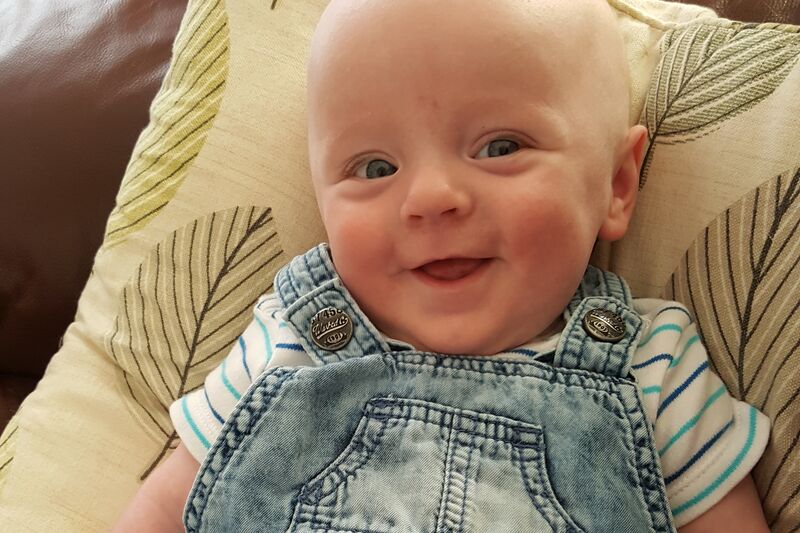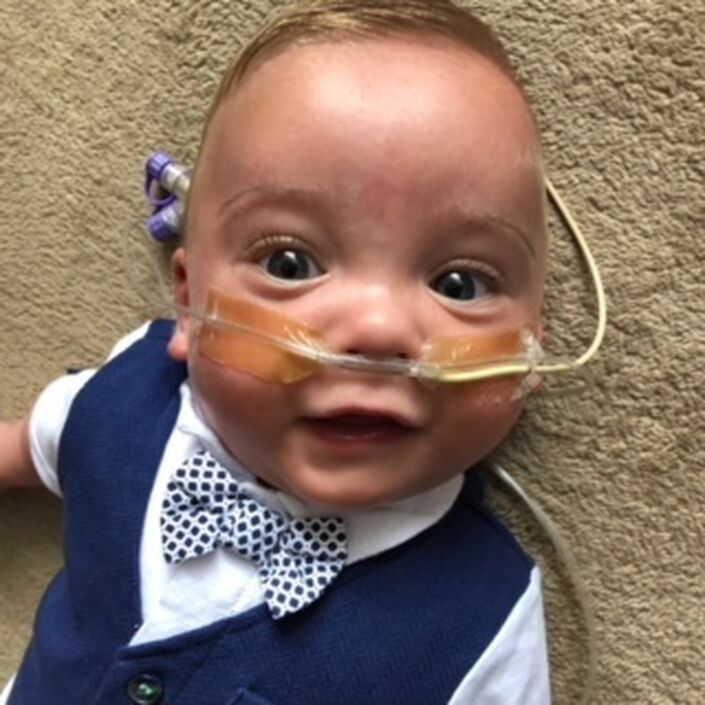I found out I was pregnant in May 2016. I took a pregnancy test and it came back negative but my period was late and that had never happened before so I went to see my GP who did a blood test. I got the call from the surgery while I was attending my uncle’s funeral 300 miles away from home. My husband couldn't get the time off work so I called him straight away to tell him the news. We were both happy and couldn't wait to start our little family.
I started to feel nauseous and tired, and as soon as these symptoms subsided I got pelvic girdle pain. I was signed off work at 23 weeks as I was struggling to walk, sit, stand or sleep comfortably. I was not enjoying pregnancy at all. Early on, I was told I had low PAPP-A which can sometimes be associated with Down’s syndrome.
When I turned up for my 30 week scan, my husband couldn't find parking so I went in on my own. The sonographer started the scan and showed me the screen. She told me to call my husband and tell him to park in the 10 minute bay at the front and she’d inform security that she had told him to park there. I asked if everything was ok and she said she would be back in a minute.
My husband arrived and the sonographer started doing the scan again, this time pointing out the baby’s high heart rate and all the fluid on his tummy. She then asked us to wait in a room while she consulted with the doctors. She came back in and said she was taking us up to the theatre floor immediately.
I felt dazed and numb. I was bombarded with questions and stripped of my clothing and jewellery. A catheter was put in and then came the needles. I normally pass out with injections but I didn't have time to think about it. Blood was taken and I was given a steroid injection to help the baby’s lungs and a magnesium drip to help aid his brain development.
My husband felt shaken up but his main job at the time was to get me through the operation. I knew my baby was poorly but at no point was I told before the c-section was performed that they all thought my baby was going to die.
When they took the baby out, the room was totally silent. He didn't cry but things didn't seem as bad as the doctors initially thought. The baby weighed 4lb 15oz but 3lb of his weight was fluid. His tummy was so distended with liquid that he couldn't open his lungs enough on his own to be able to breathe and had to be intubated.
Our son, Neil was born at 3.32pm - two hours after my scan appointment - but I was only allowed to see him at 10.00pm. I didn’t want to leave him but I saw how stretched the staff were and I had two of them with me so after 20 minutes I said I would come back the next day.
I was moved to the maternity ward. Unfortunately I had to be put with all the new mums and their babies. The nurses were apologising to me all night but there was nowhere else to put me. I told them that I didn't mind but the reality hadn't set in yet. At about 5.00am the nurses were trying unsuccessfully for the third time to get blood from me. I broke down in tears and told them they had to stop because I couldn't take any more. They agreed and sent an anaesthetist to find a vein a few hours later to take the blood they wanted.
After a few weeks, I was told that Neil had to be transferred. I was devastated because I knew this meant that his condition was too serious for the hospital to handle. He was a fighter but he kept going into supraventricular tachycardia (SVT) where his heart rate would regularly go up to around 280 - 310 beats per minute.
It turned out the transfer was the best thing for Neil. All the jiggling about in the ambulance must have motivated his bowels as he had his first poo a few hours after he arrived - this was becoming a concern for me as he was four weeks old and he still hadn’t excreted.
The Alder Hey Children’s Hospital doctors amended some of his medication and straight away he came out of SVT.
The unit at the new hospital had a completely different feel. The doctors and nurses were more used to dealing with Neil's conditions and just seemed more confident and relaxed when handling him. The massive weight on my shoulders seemed to lighten slightly.

My time in the neonatal intensive care unit (NICU) was stressful and challenging. Neil’s emergency alarm was pulled countless times in the first four weeks. I felt a knot in my stomach tighten every time it happened. I felt so guilty because other parents visiting their babies had to leave the room so the doctors and nurses could work. It was incredible how well they worked together as a team.
I liked all the doctors and nurses that looked after Neil. The doctor that was there for his delivery is now one of his consultants for his regular check-ups. He is a fantastic doctor and always remembers Neil, which always surprises me with the amount of babies he must see.
I started to get to know the other parents when Neil was moved to the nursery. After the move, I was allowed to help out in more of Neil’s care routine. I got to know the mum of the baby in the incubator next to Neil quite well and we have met up a few times since we have both been discharged from hospital.
I was so excited when we found out we could take Neil home. It took a whole day for the pharmacy to pull all his medication together as so much had to be ordered in specially. The only thing left was for Neil to pass the car seat challenge. I thought he would pass it with flying colours but he didn't. His oxygen levels kept dipping. I was devastated - we were so close to being discharged. The nurses consulted with the doctor and they agreed to discharge us because we only lived 15 minutes away.
I was so happy - we were coming home! I was nervous about getting things right though - would I do his medication right? Would I maintain his right temperature? Was I prepped enough if he had another SVT episode? The truth is, you are never ready but you do cope.
We came home on the Monday evening and things were going well. Then on Friday lunch time Neil had finished his bottle and as my husband went to get any wind up he became lifeless and quickly turned blue.
The hospital had given us training on what to do and my husband is a police officer so had been trained through work. My husband quickly placed Neil on a firm surface and began mouth to mouth and chest compressions while I dialled 999. After the second round of CPR my husband was distraught and kept saying to me: "I can't get him back".
It felt like time froze. I kept telling my husband to keep going and that the ambulance was nearly here.
At the end of the third round of CPR Neil took a breath and started to whimper. Just then two ambulances and a first responder showed up. They were amazing and took over. Neil's temperature dropped to 33 degrees so we needed to wrap him up. Then I had to gather up all his medication and hospital notes and we were blue lighted back to hospital.
It turned out he had bronchiolitis and I had to live with him for a week in the hospital. He required oxygen for that week. The NICU nurses and his doctor who looked after him at the delivery came to see him and check up on him. We were discharged again and I was incredibly nervous about taking him home but I felt it was the best place for him.
Three weeks later after a nurse’s visit, his oxygen saturation levels dipped so we had to go for an overnight stay where he was observed for 24 hours. He also had an x-ray to check his lungs were clear. It highlighted five fractured ribs from when he was resuscitated. My husband was devastated but was reassured that his actions saved Neil's life.
Neil is seven months old now and has come a long way. We still have to monitor his breathing and heart rate. The doctors have also reduced some of his medication as well. He is getting bigger and stronger every day and impressing his doctors at every appointment.

If you have been affected by any of the issues mentioned in this post and would like support, view our online support pages.


